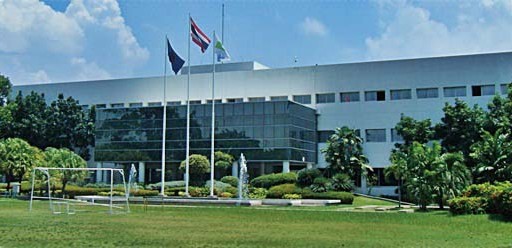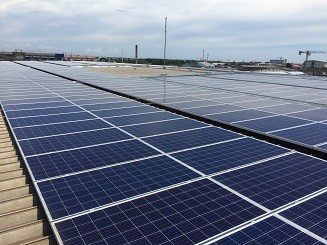DIC Group Company Siam Chemical Industry Installs Solar Panels —Part of a worldwide Group program aimed at combating global warming through the reduction of CO2 emissions—
- Sustainability
- News Release
Tokyo, Japan–DIC Corporation announced that Bangkok, Thailand-based subsidiary Siam Chemical Industry Co., Ltd., which manufactures and sells synthetic resins, has installed new solar panels that will help reinforce its production competitiveness and contribute to its efforts to combat global warming by reducing its emissions of CO2. The panels, which have a capacity of approximately 700 kW and commenced operation in August 2017, are located on the roofs of production buildings and warehouses at the company’s plant in Samut Prakan province. Electric power generated is used on production lines and in offices.
In Thailand, electric power is generated principally by thermal facilities fired by domestically produced natural gas. However, concern for the depletion of resources has made securing the energy necessary to fuel future economic growth a critical challenge. Accordingly, the diversification of the country’s energy mix is being promoted as a national policy. The adoption of environment-friendly alternatives is thus progressing thanks to efforts by the Thai government, including tax breaks for companies shifting to renewable energy.
Siam Chemical Industry manufactures and sells acrylic, polyester, polyurethane and other synthetic resins. In recent years, the company has seen a sharp increase in production of resins used in coatings for new vehicles and for vehicle repairs, reflecting increases in automobile production. This trend is expected to continue for the foreseeable future in tandem with Southeast Asian economic growth.
Against this backdrop, the company has been exploring the use of renewable energy, looking comprehensively at potential benefits in terms of, among others, securing stable supplies of electric power, enhancing production competitiveness and lowering emissions of CO2. Taking into account factors such as ability to use idle space on rooftops, eligibility for tax breaks and—important from the perspective of business continuity planning (BCP)—potential as a source of electric power, the company took the decision to install solar panels .
Siam Chemical Industry expects this move to yield benefits in terms of lower production costs beginning in fiscal year 2022 . The installation of solar panels is also expected to boost renewable energy as a percentage of total energy used by the Samut Prakan plant to 16% (calculated based on total energy used by the plant in 2016), which the company estimates will lower the plant’s annual CO2 emissions by approximately 580 metric tonnes.
By reducing both costs for electric power and emissions of CO2, a major greenhouse gas, Siam Chemical Industry is confident that the installation of solar panels will further bolster its competitiveness against other companies in Southeast Asia, as well as contribute to the realization of a sustainable society.
-Ends-
*Note: The files are in Adobe Acrobat Format. To view them you will need Acrobat Reader.




